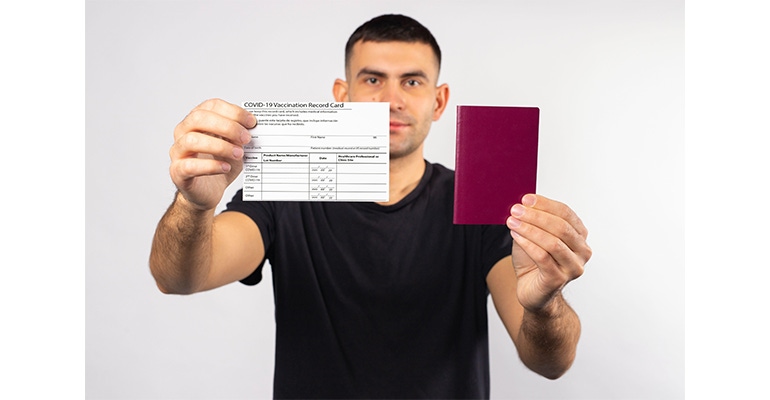Criminal Penalties for Fake Vaccination Cards
The roofing industry has seen a dramatic rise in both public and private owners requiring crew members to be vaccinated against COVID-19. This requirement poses a problem to many employers who do not have fully vaccinated crews and risk losing additional workers when the demand for skilled labor is at an all-time high.

Although many of the federal and state vaccine mandates for various sectors of the workforce may face continued judicial scrutiny, the roofing industry has seen a dramatic rise in both public and private owners requiring crew members to be vaccinated against COVID-19.
This requirement poses a problem to many employers who do not have fully vaccinated crews and risk losing additional workers when the demand for skilled labor is at an all-time high. As a result, some unvaccinated individuals either of their own volition or at the direction of employers develop ways to bypass this vaccination requirement, one of which is using fake vaccination cards. This article focuses on the risks associated with using falsified vaccination records and the severe criminal penalties associated with using or presenting them to customers to obtain projects.
First, possessing or using fake vaccination cards containing official federal seals violates 18 U.S.C. § 1017. The statute states:
Whoever fraudulently or wrongfully affixes or impresses the seal of any department or agency of the United States, to or upon any certificate, instrument, commission, document, or paper or with knowledge of its fraudulent character, with wrongful or fraudulent intent, uses, buys, procures, sells, or transfers to another any such certificate, instrument, commission, document, or paper, to which or upon which said seal has been so fraudulently affixed or impressed, shall be fined under this title or imprisoned not more than five years, or both. 18 U.S. C. § 1017
The COVID-19 vaccination cards contain the official seals of the Center for Disease Control (CDC) or the Department of Health and Human Services (DHHS), both of which are federal agencies. Therefore, if one fraudulently uses, buys, procures, transfers, etc., a vaccination card with the CDC and DHHS seals affixed on the cards, they violate the federal statute and risk being fined or imprisoned for up to five years.
Additionally, an individual may be engaging in federal wire and mail fraud when participating in any activity involving fake vaccination cards. It is a federal crime to use mail or any wire communications technology, including the Internet, as part of a scheme to defraud. When individuals engage in a scheme to defraud some entity by using a fake vaccination card or receiving a fake card in the mail, they may violate federal laws. Similarly, if one engages in this fraudulent scheme and uses mobile payment technologies (e.g., Zelle, Venmo, etc.), they are potentially committing wire fraud. The penalties for engaging in such a crime are significant and noteworthy, with the potential of up to 30 years in prison.
Lastly, each state may have its own laws for fake vaccination cards. For example, California’s Penal Code makes it illegal to create any false medical record or defraud, forge, or counterfeit any state or “other” public seal. Similarly, New York made falsifying and being in possession of vaccination records a class A misdemeanor, punishable by up to one year in prison. These are just two examples of states with their own laws for fraudulent activity. However, every state likely has some state law associated with fraudulent or forged documents that are being used to counteract attempts to falsify vaccination records.
Disclaimer: The information contained in this article is for general educational information only. This information does not constitute legal advice, is not intended to constitute legal advice, nor should it be relied upon as legal advice for your specific factual pattern or situation.
About the Author(s)
You May Also Like




